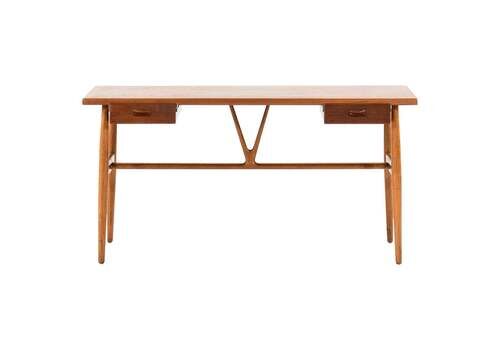Late 19th Century Bronze Entitled 'La Verité Meconnue' By Aime Jules Dalou
£4,602 per item
Shopping at Vinterior
-
14-day return guarantee
-
Outstanding customer service
-
Secure payment
-
Buyer protection
-
Trees planted for every purchase

Item details
Height
14.0 cm
Width
12.0 cm
Depth
8.0 cm
Wear conditions
Good
Wear conditions
Excellent
Shows little to no signs of wear and tear.
Good
May show slight traces of use in keeping with age. Most vintage and antique items fit into this condition.
Average
Likely to show signs of some light scratching and ageing but still remains in a fair condition.
Apparent Wear and Tear
Visible signs of previous use including scratches, chips or stains.
Please refer to condition report, images or make a seller enquiry for additional information.
Description
An enigmatic late 19th Century bronze study of a seated female nude leaning on her knees, hiding her face, on integral naturalistic canted rectangular base, signed to one side DALOU above the cracked mirror (facing to the rear), the opposing side marked Susse Fres Edts the rear with Susse Freres pastille flanked by the letters H P and S.
The title of this subject translates as 'The Truth Revealed' and refers to the young woman inconsolable having seen her true reflection in a mirror, which she has dropped and lies broken on the hard floor.
ADDITIONAL INFORMATION
Height: 14 cm
Width: 12 cm
Depth: 8 cm
Condition: Excellent Original Condition
Circa: 1890
Foundry: Susse Frères Paris
Materials: Bronze
SKU: 8790
ABOUT
Aimé-Jules Dalou (31 December 1838 – 15 April 1902) was a French sculptor, recognised as one of the most brilliant virtuosos of nineteenth-century France, admired for his perceptiveness, execution, and unpretentious realism.
He was born in Paris to a working-class family of Huguenot background, he was raised in an atmosphere of secularity and Republican socialism. He was the pupil of Jean-Baptiste Carpeaux, who sponsored him for the Petite École, where he sympathised with Alphonse Legros and Fantin-Latour. In 1854 he attended the École des Beaux-Arts de Paris in the François-Joseph Duret classroom. He combined the vivacity and richness of Carpeaux, for "he was, technically, one of the most distinguished modellers of his time", with the academic insistence on harmonious outlines and scholarly familiarity with the work of Giambologna, Pierre Puget, Peter Paul Rubens and others.
Dalou first exhibited at the Paris Salon in 1861, but he made no secret of his working-class sympathies. His politics obstructed his career under the Second Empire: he was repeatedly refused the Prix de Rome that opened sculptors' careers to future official commissions. He started to work for decorators, and through this work met Auguste Rodin and began their friendship. He made a quiet living providing decorative sculpture for the structures that lined Paris's new boulevards and providing wax models for jewelry. He married Irma Vuillier, a partnership that sustained him throughout his life; they had one daughter, Georgette, who was mentally handicapped and required constant care. Dalou's Daphnis and Chloe shown at the Paris salon of 1869, was purchased by the State.
Having identified himself too publicly with the Paris Commune of 1871, as curator at the Musée du Louvre under Gustave Courbet, he took refuge in England in July 1871, staying at first with his friend the painter and engraver Alphonse Legros. He rapidly made a name through his appointment teaching at the South London Technical Art School and the South Kensington School of Art, also in London. He was convicted in absentia by the French government of participation in the Commune, and given a life sentence.
In his eight-year English exile, Dalou's association with City and Guilds of London Art School, the National Art Training School and the artists of the New Sculpture movement laid the foundation for new developments in the post-classical British school of sculpture. He also recommended his friend and colleague Édouard Lantéri to move from France to England. At the same time Dalou executed a remarkable series of terracotta statuettes and groups, such as A French Peasant Woman and The Reader; a series of Boulogne women, such as A Woman of Boulogne telling her Beads; and a series of informal terracotta portrait busts of friends and acquaintances, rarely signed. He was commissioned to produce the large public fountain called Charity, erected at the back of the Royal Exchange (1878), and for Queen Victoria a monument to two young granddaughters in her private chapel at Windsor (1878).
He returned to France in 1879, after the declaration of amnesty, and produced a number of masterpieces. His great relief of Mirabeau replying to Dreux-Brézé illustrating an encounter of 23 June 1789, which was exhibited in 1883 and later at the Palais Bourbon, and the highly decorative panel Fraternity were followed in 1885 by The Triumph of Silenus. For the city of Paris he executed his most elaborate and splendid achievement, the vast monument, The Triumph of the Republic, erected after twenty years of work in the Place de la Nation, showing a symbolical figure of the Republic, aloft on her car, drawn by lions led by Liberty, attended by Labour and Justice, and followed by Abundance. It is somewhat in the taste of the Louis XIV period, ornate, but with a forward thrust to the ensemble and exquisite in every detail.
Dalou, who was awarded the Grand Prix of the Exposition Universelle (1889), was made a commander of the Legion of Honor. He was one of the founders of the Société Nationale des Beaux-Arts, and was the first president of the sculpture section.
Dalou died in Paris on 15 April 1902, aged 63, and was interred in the Cimetière du Montparnasse in Paris. His auction record, set at Sotheby's on 21 May 2014 is £362,500 for Boulonnaise Allaitant Son Enfant (a young mother from Boulogne feeding her child).
Condition report:
Excellent. Wear consistent with age and use.
Cancellations
We offer free cancellations and full refund for orders cancelled before dispatching. View full policy.
Returns
We have a 14-day return guarantee for orders from individual sellers, within the UK and European Union. View full policy.
Free collection available
Yes
Similar Statues
Similar Statues
More from this seller
More from this seller
Choose a Wishlist
Create Wishlist
- Ships from London, United Kingdom
Cancellations and Returns
Last updated: 24th March 2025
We want everybody’s Vinterior experience to be seamless, so both buyers and sellers can fall in love with pre-loved. We designed our Terms of sale to treat everybody fairly.
However, sometimes things don’t go exactly to plan, and you may need to cancel or return an order.
To prevent this, we encourage you to check listings, photos and descriptions carefully before you buy. If you aren’t sure about a piece’s condition, size, provenance or shipping, just ask; click Contact seller to get in touch. Always contact your seller first if you have any queries, at any point in your purchase.
Our buyers receive the same protection when buying from all our sellers, both professional and verified.
Can I cancel an order?
There are many reasons why you might need to cancel an order, and you'll often be entitled to a refund. To cancel an order, click Create cancellation on the order page.
If you cancel your order before it has been dispatched, you will receive a full refund - including delivery costs. However, if your item has been shipped, delivery costs will not be included in your refund.
Please note: orders of bespoke, personalised or made-to-order pieces cannot be cancelled.
Can I return an order?
We understand that sometimes a piece isn’t the perfect fit. So if you no longer want your order, our returns process will ensure it finds a new home fast.
The Vinterior Guarantee included with your purchase entitles you to 14-day returns - allowing you to return any item within 14 days of the delivery date (except in specific circumstances, detailed below).
You can return your order if...
It isn't what you expected
If what arrives isn’t what you ordered, you can open a return. Just send us some photo evidence that the listing was inaccurate, misleading or misrepresented your purchased piece, and you’ll receive a refund.
You change your mind
If you don’t feel a piece is right for your space, you can return it. Once you request a change of mind return, you’ll be responsible for shipping the piece back to your seller as soon as possible. Delivery costs are non-refundable.
It's damaged in transit
In the rare event that an item arrives damaged or defective, you have a full 30 days from the date of delivery to return it for a full refund.
If your purchase arrives broken, always let us know. If Proovia delivered the piece, we can raise an insurance claim on the seller’s behalf. Or, the seller can raise a claim with their chosen courier.
What can't I return?
Just as there are some orders you can’t cancel, there are some you cant return, too. Personalised, bespoke or made-to-order pieces are non-returnable, and non-refundable. Sellers may also reject your return if the item has been altered in any way.
Please note: pieces on our site are pre-loved, not new. They may show some wear and tear; this is not sufficient grounds for a refund, unless the seller has misrepresented the item’s condition.
Lastly, neither Vinterior nor our sellers are liable for any damages or loss sustained in transit via third parties.
I'm eligible for a return. Now what?
To initiate a return, log into your Vinterior account, then go to the relevant order page and click Create a return. In the return request, be sure to include all the details: the reason for your return, an in-depth description, and photos of any issues or damage.
How will I receive my refund?
Once the seller confirms they’ve received the item (in the same condition it was sent), we will send your refund to your original payment method.
All items are inspected on return. If the seller receives the return with damage they don’t recognise, we will not be able to process your refund and the seller may need to send the piece back to you. You will be required to cover these delivery costs.








